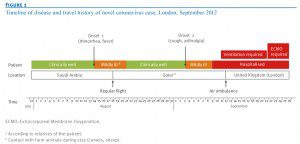

While in Saudi Arabia the 49 year old male patient developed mild respiratory illness (rhinorrhea and fever). These symptoms resolved several days after his return to Qatar on 18 August. At the beginning of September he developed another respiratory illness which worsened and required his transport to London. Later that month the novel coronavirus was detected in his respiratory tract.
This timeline suggests that the patient acquired the viral infection in Qatar, as he was there for 16 days prior to illness. How he obtained the infection is not known. He did spend time on a Qatari farm where sheep and camels are kept. The SARS coronavirus is believed to have originated in bats and spread to humans either directly or through animals in meat markets, and the new coronavirus is related to bat coronaviruses.
Sixty-four close contacts were identified among the patient’s health care workers, friends, and family during his stay in the United Kingdom. None of these have developed severe disease, while 13 have displayed mild respiratory symptoms, and the new coronavirus was not detected 10 of these individuals.
These results show that no human to human transmission of the novel coronavirus has taken place that resulted in mild or severe disease. Serological testing for anti-viral antibodies must be done to determine if asymptomatic infections have occurred. It will also be important to conduct serological surveys to determine whether there is evidence for infection in the general populations of Qatar and Saudi Arabia. It is also likely that animal surveys will be done to identify potential reservoirs for the virus.
RG Pebody et al. 2012. The United Kingdom public health response to an imported laboratory confirmed case of a novel coronavirus in September 2012. Eurosurveillance, Volume 17, Issue 40.
Update: A third human infection with the novel coronavirus was confirmed on 4 November 2012 in Saudi Arabia.

Pingback: TWiV 204: M m m my corona